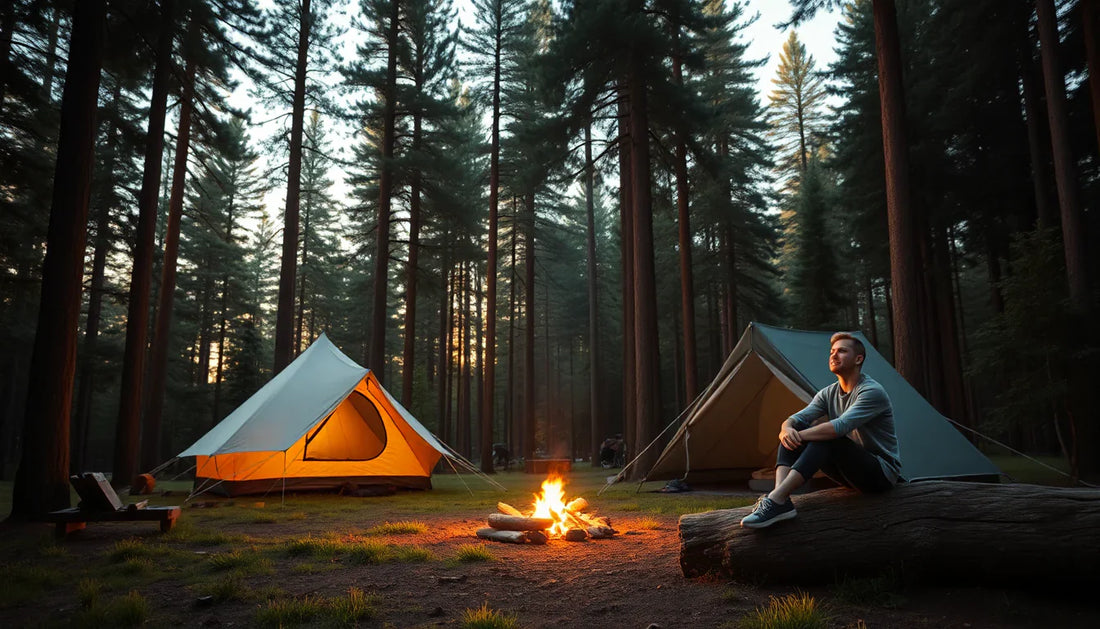
Camping for Mental Health: How Nature Helps You Recharge
Share
In today's fast-paced, technology-driven world, mental health challenges have become increasingly prevalent. Stress, anxiety, and burnout have become all too common as we struggle to keep up with the demands of modern life. However, there is a powerful antidote to these mental health woes – the great outdoors. Camping, in particular, has emerged as a transformative tool for improving overall well-being and restoring a sense of balance.
Understanding Mental Stress in Modern Life
The current stress epidemic is a testament to the toll that our hectic lifestyles can take on our mental health. Constant exposure to digital stimuli, long work hours, and the pressure to constantly be "on" can leave us feeling overwhelmed and depleted. The need for natural healing methods has never been more pressing, as traditional therapies and medication often fall short in addressing the root causes of these issues.
How Nature Impacts Mental Health
Numerous studies have demonstrated the profound impact that nature can have on our psychological well-being. Spending time in outdoor environments has been shown to reduce stress, improve mood, and enhance cognitive function. The calming sights, sounds, and smells of nature have a soothing effect on the mind, helping to alleviate the symptoms of anxiety and depression.
Camping as a Mental Health Strategy
Camping, in particular, offers a unique opportunity to immerse oneself in the natural world and reap the mental health benefits it provides. By disconnecting from the digital distractions and demands of everyday life, campers can engage in mindfulness practices, physical activity, and restorative rest – all of which contribute to improved mental clarity and emotional well-being.
Specific Mental Health Benefits of Camping
The mental health benefits of camping are multifaceted and far-reaching. From mood improvement to stress relief, the positive impact of this nature-based activity is well-documented. Camping can also enhance mental clarity, increase physical activity, and promote better sleep patterns – all of which are crucial for maintaining overall mental health and well-being.
Mood Improvement
Numerous studies have shown that spending time in nature can have a positive impact on mood. The calming and restorative effects of the outdoors can help alleviate symptoms of depression and anxiety, leading to an improved overall sense of well-being.
Stress Relief
The act of camping itself can be a powerful stress-reduction tool. By removing oneself from the constant demands and distractions of daily life, campers can experience a profound sense of relaxation and rejuvenation. The peaceful surroundings and physical activity associated with camping can help lower cortisol levels, the primary stress hormone.
Enhanced Mental Clarity
The quiet, contemplative nature of camping can also enhance mental clarity and focus. Without the constant stimulation of technology and the pressures of work or social obligations, campers can engage in deeper reflection and introspection, leading to a greater sense of self-awareness and personal growth.
Increased Physical Activity
Camping often involves a range of physical activities, such as hiking, swimming, and exploring the natural environment. This increased physical activity not only benefits physical health but also contributes to improved mental well-being. Exercise has been shown to release endorphins, which can boost mood and reduce stress.
Better Sleep Patterns
The natural rhythms of the outdoors, including exposure to natural light and the absence of artificial lighting, can help regulate the body's circadian rhythms. This, in turn, can lead to improved sleep quality, which is essential for maintaining mental health and overall well-being.
Practical Camping Tips for Mental Wellness
To maximize the mental health benefits of camping, it's important to approach the experience with intention and mindfulness. Choosing the right camping location, engaging in mindful outdoor activities, and minimizing technology use can all contribute to a more restorative and rejuvenating experience.
Choosing the Right Camping Location
When selecting a camping destination, consider factors such as proximity to natural features (e.g., forests, lakes, mountains), accessibility to hiking trails, and the overall tranquility of the environment. Opt for locations that offer a sense of seclusion and solitude, allowing you to fully immerse yourself in the natural world.
Mindful Outdoor Activities
Engage in activities that encourage mindfulness and present-moment awareness, such as meditation, journaling, or simply observing the natural surroundings. These practices can help you cultivate a deeper connection with the environment and foster a greater sense of inner peace.
Minimizing Technology Use
One of the key benefits of camping is the opportunity to disconnect from the digital world. Limit your use of smartphones, laptops, and other electronic devices during your camping trip, allowing yourself to fully immerse in the present moment and reap the mental health benefits of being in nature.
Conclusion
In a world that often feels overwhelming and disconnected, camping offers a powerful antidote to the mental health challenges we face. By immersing ourselves in the natural world, we can tap into the restorative and rejuvenating properties of the great outdoors, fostering improved mood, reduced stress, and enhanced mental clarity. As we navigate the complexities of modern life, let us embrace the transformative power of camping and rediscover the profound healing that nature has to offer.
